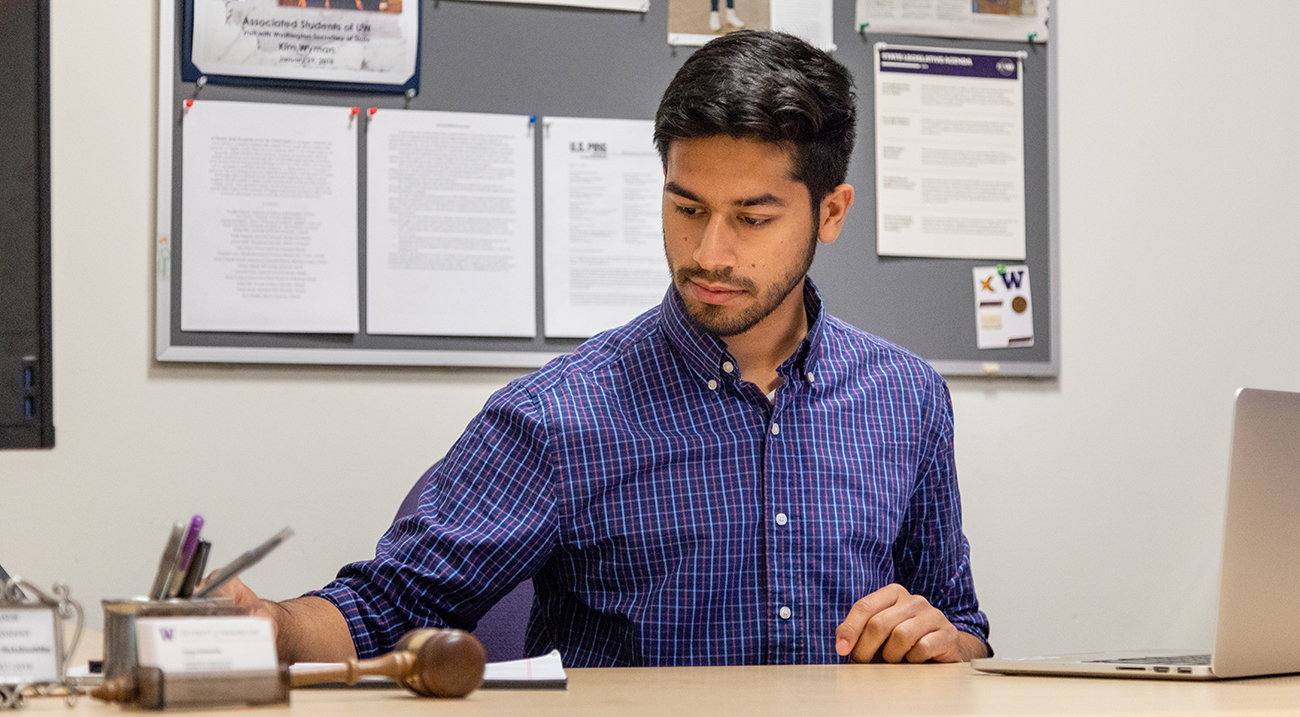UW senior Osman Salahuddin is checking his watch. As president of the Associated Students of the University of Washington (ASUW), Salahuddin always has another meeting to get to, another project to tackle. But his packed schedule is nothing new. Over the past four years — the first three as a commuter student from Redmond — Salahuddin has completed a major in neurobiology, a minor in English, four research projects, a study abroad in Rome, and demanding leadership roles with ASUW.
“Prioritizing has been a really big thing,” says Salahuddin. “And I’m very diligent with my calendar.”
That calendar started filling up as soon as Salahuddin arrived on campus. As a freshman, he found a sense of community through involvement with the Muslim Student Association, whose board he joined the following year. Salahuddin also participated in UW Leaders, an ASUW program that pairs freshman and sophomores with more seasoned students who serve as mentors. Weekly programming covers topics like team building, resume development, and professional leadership.

To further his leadership experience, Salahuddin joined the ASUW’s student senate during his sophomore year, where he gained “a really good perspective on the ways decisions are made in the University.” He parlayed that into the role of ASUW’s director of community relations the following year, serving as a liaison to student communities across campus, including residential students, commuter students, students in the Greek community, student athletes, and diversity groups in the Ethnic Cultural Center. He also joined the Arts & Sciences Advisory Council for Students, a group that advises College of Arts & Sciences leadership on academic issues that impact students.
“The council is made up of 13 students, all with their own experiences and communities, who come together to work on issues with Dean Stacey,” Salahuddin says. “Hearing what other students are studying, I learned about how academics are different for each of us.”
Looking back, everything that I’ve done at the University of Washington has prepared me for something else.
This year, as ASUW president, Salahuddin has built on his previous leadership experiences to tackle tough University-wide issues like mental health issues, student safety, housing, and access — though pressing concerns have sometimes derailed his long-term agenda. “Fall quarter I had so many goals, but then I was pulled into the provost search committee and that was a months-long process that took a lot of time,” Salahuddin says. “But that’s also what I love about this job. I’m not doing one thing; I‘m doing many different things that allow me to balance different needs and opinions and relay them to different groups on campus.”
Despite Salahuddin’s demanding leadership roles, he has always carved out time to focus on academics, especially his neurobiology major. “The tie between the scientific details and the actual behavior of humans and animals is what draws me to neurobiology,” he says. “I like that they teach what our brain responses make us feel at the non-scientific level.” Salahuddin added an English minor — and participated in a Department of English study abroad program in Rome — to round out his education.

“English shows us how history has been shaped through different lenses,” he says. “My English minor has taught me a lot more of the subjective side of what is going on in the world — it allows me to think about how my perspective is different than your perspective even though we’re standing in the exact same place, and yet each of our perspectives is valid.”
That humanist approach has informed Salahuddin’s choice of research projects as well. His first research position, at Fred Hutchinson Cancer Research Center, focused on aging through the study of yeast. But Salahuddin wanted to go beyond a lab setting and interact with more people. He joined a Department of Biology research project linking students’ study habits and their test scores, and a project at the UW Medical Center (UWMC) working with patients with traumatic brain injuries. He also conducted research aimed at improving patient care in the UWMC Emergency Department.
Though Salahuddin once thought he’d be a doctor, his UW experiences have led him down a different path. “I’m no longer solely interested in medical school but I’m still interested in health care as a whole,” he says. “I want a role where I talk to more people, create more solutions, and help more patients than just the one I would be helping as a physician. I’m looking at fields at the intersection of business, technology, and medicine.”
In July, Salahuddin will begin a job as a health care consultant in New York City, helping companies in diverse sectors explore their health care options. Looking ahead, he hopes to pursue an MBA with an emphasis on health care.
“My role as ASUW director of community relations prepared me for being ASUW president, and that is preparing me really well for the job I’m taking after graduation,” he says. “My neurobiology major and English minor will hopefully prepare me for graduate school. Looking back, everything that I’ve done at the University of Washington has prepared me for something else.”
. . .
During his time at the University, Osman Salahuddin received support from a Washington State Opportunity Scholarship, an Office of Minority Affairs & Diversity scholarship, a GO Scholarship for study abroad, and more. Learn more about how you can support College of Arts & Sciences students like Salahuddin.
More Stories

AI in the Classroom? For Faculty, It's Complicated
Three College of Arts & Sciences professors discuss the impact of AI on their teaching and on student learning. The consensus? It’s complicated.

What Students Really Think about AI
Arts & Sciences weigh in on their own use of AI and what they see as the benefits and drawbacks of AI use in undergraduate education more broadly.

A Love of Classics and Ballroom
Michael Seguin studied Classics at the UW and now owns Baltimore's Mobtown Ballroom. The two interests, he says, are more connected than they might seem.